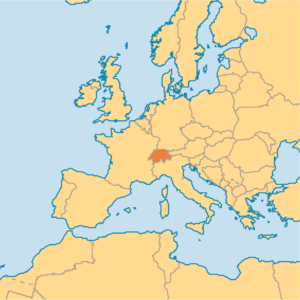NOVEMBER 13 – TODAY’S READING FROM THE ONE YEAR BIBLE- Ezekiel 27:1-28:26;
Hebrews 11:17-31; Psalm 111:1-10; Proverbs 27:15-16
TODAY’S READING FROM THE OLD TESTAMENT- Ezekiel 27:1-28:2
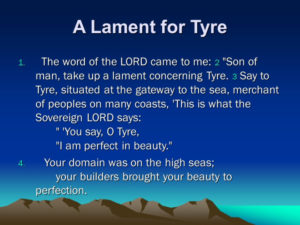 Ezekiel devotes three chapters prophesying the six judgments that are to fall upon Tyre, the principal city of Phoenicia. The name ‘Tyre’ means ‘rock,’ referring to the fortress that was built on a rock outcropping a half-mile from the shore. Half of the city was built on the shore, and the other half on the rock island. The Egyptians and the Assyrians competed to maintain control of Tyre because of its strategic importance commercially and militarily. The Assyrians subdued Tyre in 722 B.C. after a five-year siege. Nebuchadnezzar of Babylon continued the attempts begun by the Assyrians and conquered the shoreline city after besieging the city for thirteen years (586- 572 B.C.). However, he failed to take the rock fortress that was half a mile offshore.
Ezekiel devotes three chapters prophesying the six judgments that are to fall upon Tyre, the principal city of Phoenicia. The name ‘Tyre’ means ‘rock,’ referring to the fortress that was built on a rock outcropping a half-mile from the shore. Half of the city was built on the shore, and the other half on the rock island. The Egyptians and the Assyrians competed to maintain control of Tyre because of its strategic importance commercially and militarily. The Assyrians subdued Tyre in 722 B.C. after a five-year siege. Nebuchadnezzar of Babylon continued the attempts begun by the Assyrians and conquered the shoreline city after besieging the city for thirteen years (586- 572 B.C.). However, he failed to take the rock fortress that was half a mile offshore.
 Alexander the Great was the first to fully conquer the city and fortress. He did this by destroying the villages on the shore and building a causeway to the island from the rubble. This fulfilled the prophecy found in Ezekiel 26:12
Alexander the Great was the first to fully conquer the city and fortress. He did this by destroying the villages on the shore and building a causeway to the island from the rubble. This fulfilled the prophecy found in Ezekiel 26:12
Ezekiel 26:12 12 “Also they will make a spoil of your riches and a prey of your merchandise, break down your walls, and destroy your pleasant houses, and throw your stones, your timbers and your debris into the water.”
Ezekiel goes on to prophesy Tyre’s destruction. God likens Tyre to a magnificent ship that is wrecked and lowered into the burial ground of the ocean, brought down to the pit.
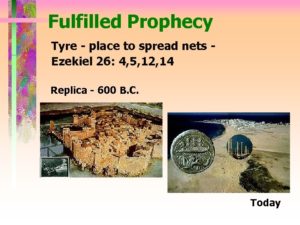 Ezekiel 26:14 14 “I will make you a bare rock; you will be a place for the spreading of nets. You will be built no more, for I the LORD have spoken,” declares the Lord GOD.
Ezekiel 26:14 14 “I will make you a bare rock; you will be a place for the spreading of nets. You will be built no more, for I the LORD have spoken,” declares the Lord GOD.
This part of the prophecy was also fulfilled by the hand of Alexander. Nebuchadnezzar, however, ravaged the mainland settlement and isolated the island fortress.
Tyre’s ability to resist some of the greatest armies in history gave its inhabitants a callous sense of pride and indifference to human suffering. The Lord takes note that they rejoiced in the destruction of Jerusalem (26:2).
Chapter 27 gives us the second funeral dirge for Tyre. First, he describes the city’s pride in its maritime success (27:1-9), its military might (27:10-11), and commercial prominence (27:12-24). But then he predicts how they will be completely undone, defeated on land and at sea.
 Chapter 28 describes the fall of the King of Tyre. He is denounced for his arrogance and greed (28:1-5), and his punishment is announced. He is to be brought down to the pit in a violent death.
Chapter 28 describes the fall of the King of Tyre. He is denounced for his arrogance and greed (28:1-5), and his punishment is announced. He is to be brought down to the pit in a violent death.
The pride of self-will is on display as this King proclaims, “I am a god” (28:2, 6, 9).
The ESV Study Bible gives a commentary on the lamentation over the King of Tyre found in Chapter 28:13-19.
“Tyre is likened to a second Adam, clearly a created being (vv. 13, 15) and yet a “cherub” (v. 14). It is in the “garden of God” in v. 13, and on the “mountain of God” in vv. 14 and 16. Some would see v. 17 as a poetic allusion, wherein Ezekiel likens the downfall of the proud king of Tyre to the fall and curse on Satan in Genesis 3:1–15. At minimum, the extravagant pretensions of Tyre are graphically and poetically portrayed, along with the utter devastation inflicted upon Tyre as a consequence (vv. 18–19).” (ESV Study Bible)
Ezekiel is sarcastic when he says that the King of Tyre is wiser than Daniel, Ezekiel’s contemporary and fellow prophet. Daniel’s character is the antithesis of that of the King of Tyre, whose wisdom was strictly related to making money and lacked any understanding of the truth about God.
Of the twenty elements associated with the king of Tyre in 28:11-19, most are found in Isaiah’s indictment of the King of Babylon (14:12-17). These two kings are types of the ‘prince of this world’, Satan.
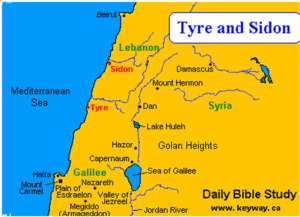 The 28th chapter of Ezekiel concludes with the prophecy against Sidon, Tyre’s sister city, located about twenty-three miles north of Tyre. It was a more vulnerable city, subject to the threat of military attack. Jezebel, the infamous wife of King Ahab of Israel, was a Sidonian. She reinstituted Baal worship in Israel and hastened its fall to the Assyrians.
The 28th chapter of Ezekiel concludes with the prophecy against Sidon, Tyre’s sister city, located about twenty-three miles north of Tyre. It was a more vulnerable city, subject to the threat of military attack. Jezebel, the infamous wife of King Ahab of Israel, was a Sidonian. She reinstituted Baal worship in Israel and hastened its fall to the Assyrians.
The fall of Sidon would not be viewed as a chance event. The fulfillment of this prophecy would vindicate the Name of the Lord in the estimations of the people.
Ezekiel 28:23 23 “For I will send pestilence to her and blood to her streets, And the wounded will fall in her midst by the sword upon her on every side; Then they will know that I am the LORD.”
How refreshing to have a few words at the end of this chapter concerning a future hope for the house of Israel!
Ezekiel 28:24-26 24 “And there will be no more for the house of Israel a prickling brier or a painful thorn from any round about them who scorned them; then they will know that I am the Lord GOD.” 25 ‘Thus says the Lord GOD, “When I gather the house of Israel from the peoples among whom they are scattered, and will manifest My holiness in them in the sight of the nations, then they will live in their land which I gave to My servant Jacob. 26 “They will live in it securely; and they will build houses, plant vineyards and live securely when I execute judgments upon all who scorn them round about them. Then they will know that I am the LORD their God.”
TODAY’S READING FROM THE NEW TESTAMENT – Hebrews 11:17-31
 We continue to read of “The Heroes in the Hall of Faith”. The writer records that these people believed God and took obedient actions that indicated that they truly heard His Word. Read how their deeds were accomplished: By faith Abraham obeyed God at Mt Moriah and enacted the redemptive drama of Calvary receiving his son from the dead (v.17). By faith, Isaac blessed Jacob with a view to the future (v.20). By faith, Jacob blessed Joseph’s son and worshiped God for his faithfulness (v.21). By faith, Joseph exhibited his true hope was tied up with the Promised Land and not Egypt by giving instructions about his bones being taken there after his death (v.22). By faith, Moses’ parents hid him for three months (v.23). By faith, Moses refused to be known as the son of Pharaoh’s daughter but identified with the purposes of God (v.24). By faith, the people passed through the Red Sea on dry land (v.29). By faith, the people heeded God’s Word and marched around Jericho as God caused the walls to come tumbling down (v.30). By faith, Rahab welcomed the spies and experienced deliverance.
We continue to read of “The Heroes in the Hall of Faith”. The writer records that these people believed God and took obedient actions that indicated that they truly heard His Word. Read how their deeds were accomplished: By faith Abraham obeyed God at Mt Moriah and enacted the redemptive drama of Calvary receiving his son from the dead (v.17). By faith, Isaac blessed Jacob with a view to the future (v.20). By faith, Jacob blessed Joseph’s son and worshiped God for his faithfulness (v.21). By faith, Joseph exhibited his true hope was tied up with the Promised Land and not Egypt by giving instructions about his bones being taken there after his death (v.22). By faith, Moses’ parents hid him for three months (v.23). By faith, Moses refused to be known as the son of Pharaoh’s daughter but identified with the purposes of God (v.24). By faith, the people passed through the Red Sea on dry land (v.29). By faith, the people heeded God’s Word and marched around Jericho as God caused the walls to come tumbling down (v.30). By faith, Rahab welcomed the spies and experienced deliverance.
Why does the writer tell us this? So that we might not be among those who fall back into something less than an ongoing relationship of faith in the Living God. He encourages us to go forward in the story by trusting the full and final Word of God given to us in Christ.
TODAY’S READING FROM THE BOOK OF PSALMS – Psalm 111:1-10
How good it is to praise the Lord with God’s people!
Psalm 111:1 1 Praise the LORD! I will give thanks to the LORD with all my heart, In the company of the upright and in the assembly.
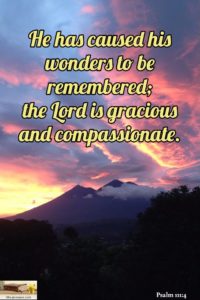 The Psalmist gives us great reasons to praise the Lord in verses 1-9: His works, His deeds, His wonders, His character, His provisions, His self-revelation in His Word, and His worthiness shown in His faithful fulfillment of all that He promises.
The Psalmist gives us great reasons to praise the Lord in verses 1-9: His works, His deeds, His wonders, His character, His provisions, His self-revelation in His Word, and His worthiness shown in His faithful fulfillment of all that He promises.
Psalm 111:4 4 He has made His wonders to be remembered; The LORD is gracious and compassionate.
His precepts are trustworthy, and His works exhibit aspects of His character. The climax is the last on the list- the redemption He provides for His people.
Do you worship the Lord? You have not even begun to discover wisdom until you have done so.
Psalm 111:10 10 The fear of the LORD is the beginning of wisdom; A good understanding have all those who do His commandments; His praise endures forever.
TODAY’S READING FROM THE BOOK OF PROVERBS – Proverbs 27:15-16
Proverbs 27:15-16 15 A constant dripping on a day of steady rain and a contentious woman are alike; 16 He who would restrain her restrains the wind, and grasps oil with his right hand.
I think this proverb applies to all of us. Let us not be contentious and a constant source of aggravation to people. May people not feel that we are prickly, difficult, or unrestrainable.
PRAY FOR THE NATIONS – SWITZERLAND
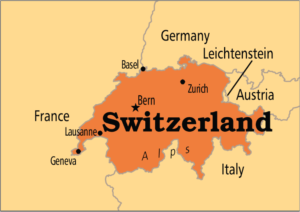 (from “Operation World Prayer guide” and Prayercast.com)
(from “Operation World Prayer guide” and Prayercast.com)
Switzerland
Swiss Confederation
Europe
Area: 41,293 sq. km
Mountainous land; 25.7% agriculturally unproductive. The Swiss Alps are one of the greatest tourist attractions in the world.
Population: 7,594,561 Annual Growth: 0.41%
Capital: Bern (admin); Lausanne (judicial)
Urbanites: 73.6%
HDI Rank: 9 of 182 (U.N. Human Development Reports 2009)
Peoples
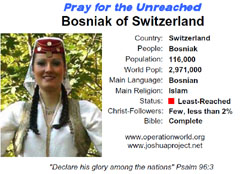 Peoples: 40 (18% unreached) All peoples
Peoples: 40 (18% unreached) All peoples
Unreached Peoples Prayer Card
Official language: German, French, Italian, Romansh Languages: 26 All languages
Religion
Largest Religion: Christian
|
Religion |
|
Pop % |
Ann Gr |
|
5,753,639 |
75.76 |
-0.3 |
|
|
336,275 |
4.4 |
1.2 |
The breathtaking majesty of the Alps, stunning blue lakes, historic medieval cities, and pastoral farming communities combine to give Switzerland its world-renowned natural beauty that draws admirers from around the world. Over 700 years of history as a nation only magnifies its allure. German, French, Italian, and Romansch are all official languages. Linguistic and cultural diversity are accentuated by the distinctions between life in the mountain valleys and the densely populated cities. Today it is home to the highest proportion of foreign residents of any major state in Europe.
Founded in 1291, Switzerland is one of the world’s oldest existing republics. Its position in central Europe and its centuries-old neutrality have allowed the nation to become one of the wealthiest in the world, with one of the highest per person incomes. The successful and industrialized economy is largely based on trade, tourism, and banking. Pressure from the European Union (E.U.) and the United States has forced historically secretive Swiss banks to share account details in order to combat tax evasion. Switzerland has long retained a strong and unique commitment to neutrality, even throughout two world wars waged around it. Its system of direct democracy, where citizens have more power than in a representative model, is unparalleled in any other country. Though it is one of the few countries in western Europe to not join the E.U., Switzerland maintains treaties that allow for the free movement of goods, services, capital, and people. This has led to a rapid growth in population, making it difficult to regulate the influx of immigrants that now make up a quarter of the population.
Switzerland’s rich Christian heritage is represented by great reformers such as Ulrich Zwingli, the father of the Swiss Reformation, and John Calvin. Historically, this nation was greatly divided between Catholicism and Protestantism. Immigration has led to an increase in many other religions such as Islam (6%), as well as 15% who claim no religion at all. The cultural norms of wealth, spiritual indifference, and vague religious commitment have all greatly hindered the Church, leaving very few who have a Biblical understanding of Christianity. Many youths are experimenting with eastern religions and even the Occult. Both Catholic and Reformed churches face decline amid increasingly liberal theology. Yet active movements for renewal exist, and a fresh commitment to evangelism is growing. Vibrant youth ministries and evangelical churches are working hard to adapt to a changing culture and better reach those disinterested in traditional models of the institutional church.
Challenges for Prayer
The Arbeitsgemeinschaft Evangelischer Missionen (AEM), formed in 1972, strengthens and coordinates missionary vision and outreach, especially in the Free Churches. There are 45 member agencies, representing nearly 1,500 long-term missionaries. The Fédération des Missions Evangéliques Francophones (FMEF) has the same vision for the French-speaking Protestant churches in Switzerland, France and Belgium. Mission21, Échange et Mission (D.M.) and other groups connected to the Evangelical Alliance serve in similar capacities. Pray for greater awareness and sense of responsibility in Swiss churches for world evangelization, and of support for the commendably large missionary force.
Less-evangelized peoples include:
a) The German-speaking cantons of Luzern, Zug, Schwyz, Unterwalden and Uri, the largely Francophone Valais and Fribourg and the Italian-speaking Ticino are culturally Catholic with few evangelical groups, although there is increased openness in several Catholic cantons.
b) The more than 100 foreign nationalities. Switzerland has the highest proportion of foreign residents of any major state in Europe. The major cities are becoming internationalized – Geneva is 45% non-Swiss! A number of agencies and churches are committed to ministry among them. Most are linked to Arbeitsgemeinschaft für interkulturell Zusammenarbeit (AgiK). Some of these minorities are highly unevangelized. Others, such as Latinos and Africans with over 200 congregations, are actually contributing to outreach in Switzerland.
c) Religious minorities. Not long ago, almost every person in Switzerland would have been either Catholic or Protestant. Today, around one in seven considers himself non-religious. Muslims account for as much as 6%, with many other religions appearing and growing rapidly. Swiss society and indeed most Swiss Christians are ill equipped to handle these changes in religious population. Pray for clear and loving outreach to these new faith communities.
PRAYER: Lord, Your Word is forever settled in heaven. It is trustworthy. We can bank on it. You remind us that if we are willing to do Your will and ask for wisdom, we shall find the wisdom we are looking for. So we look to you today for guidance as we seek to walk in the light of Your revealed truth. We do not forget Your wondrous work of redemption. We don’t take it lightly that we have been rescued by the great deed of mercy in sending Your Son to be our substitute. He lived the righteous and holy life we failed to live and took the just punishment for our sins, paying the full ransom. Keep us mindful of the glorious grace that has been given to us. In Jesus’ Name. Amen.

